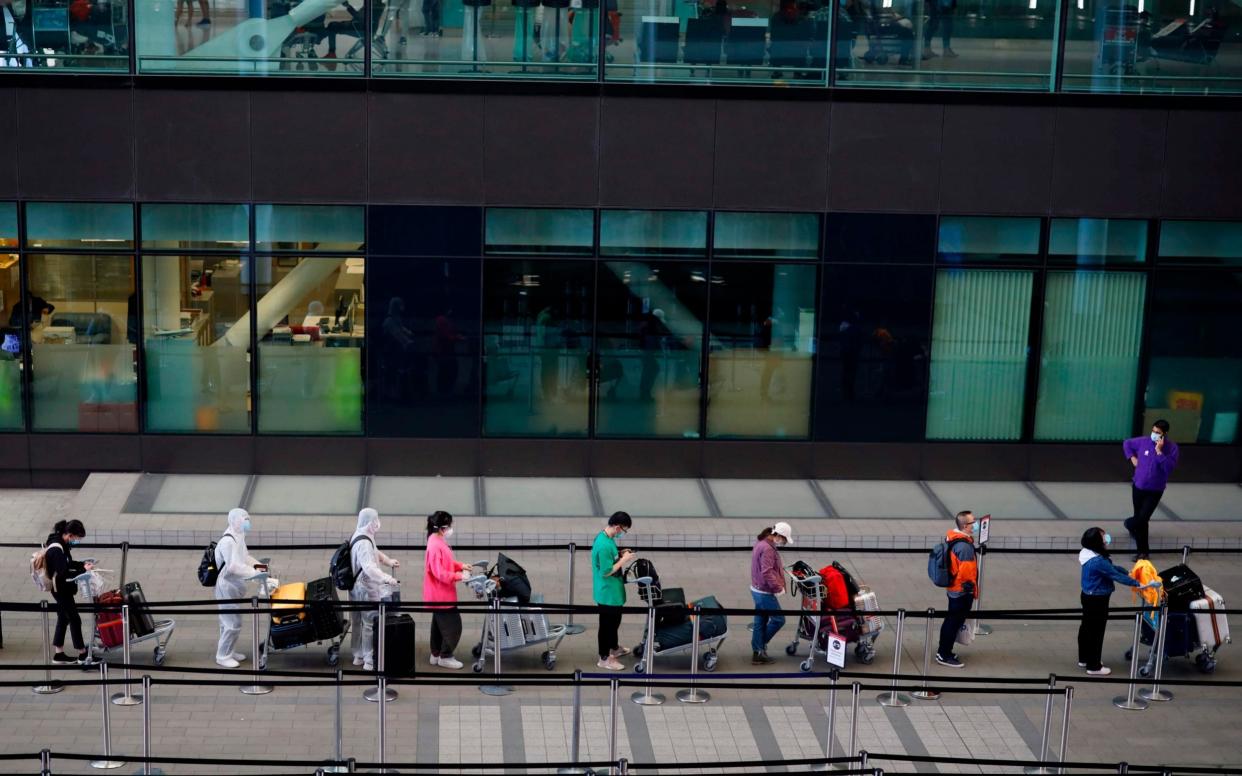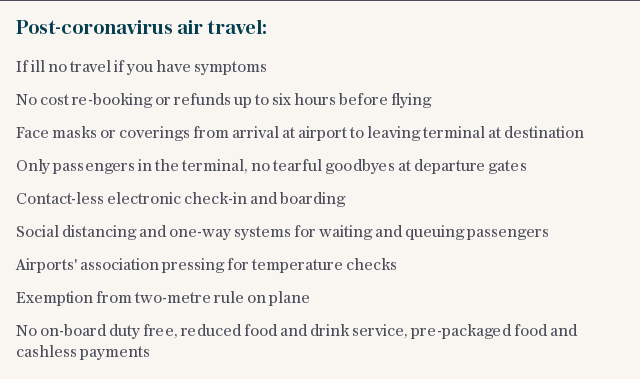Quarantine plan for UK arrivals could be ditched as MPs revolt


Ministers are working on plans to replace quarantine for arrivals to the UK amid signs the troubled policy could be phased out within weeks of being brought in.
The “unworkable” plan could be largely superseded by so-called air bridges by the end of June, with officials working behind the scenes to strike multiple deals with foreign countries to make them exempt.
Under the new rules all UK arrivals will be asked to stay at home for 14 days to stop the spread of coronavirus and could be fined £1,000 if they fail to stick to the rules.
The quarantine policy had been championed by Dominic Cummings, Boris Johnson’s chief adviser, but there are growing signs that he is losing an ongoing battle within Government and even within Downing Street over its future.
A senior government source told the Telegraph that Boris Johnson was now "personally in favour" of the air bridges policy and has become convinced it is the best strategy to contain the virus while allowing travel to begin again.
The Telegraph understands that the Department for Transport and the Home Office have been told to come up with plans to allow the introduction of air bridges by the end of the month.

The regulations enacting quarantine from June 8 will be laid in Parliament today and it remains possible that MPs could force a vote on the matter.
However, the plan has caused a growing revolt among Tory MPs, while more than 200 tourist and aviation business chiefs have warned that quarantine will devastate a £200 billion industry that accounts for four million jobs.
Rishi Sunak, the Chancellor, said the policy will be “regularly” reviewed on a “three week basis” as the Government sought to head off any possible backbench rebellion.
Officials are looking to negotiate the travel corridors with low-risk countries like Greece, Portugal and Australia to enable passengers to sidestep the 14-day quarantine for all arrivals, including returning Britons.

Boris Johnson has confirmed that a downscaling of the quarantine policy is “possible” by its review date of June 29 and one Whitehall source said: “There is definitely an intention to get [air bridge] agreements in place ready to announce at the point of the next review.
"Everyone in Government wants to scrap it or make the air bridges work apart from the Home Office which is feeling slightly under attack."
Adopting air bridges would amount to a climbdown by Downing Street, which distanced itself from the idea when it was floated by Transport Secretary Grant Shapps in May. Mr Shapps was even accused of “freelancing”, but his policy is now set to become the central plank of the strategy for the eventual end of quarantine.
Mr Cummings’ authority within Government is said to have been undermined by the controversy over his trip to Durham during lockdown, emboldening ministers and MPs who might otherwise have been cautious about going against him on policy matters.
A Home Office source said: "We haven't put dates on it because that would be arbitrary. These measures are designed to save lives, prevent a second wave of coronavirus and will only change when the science says it's right."
The Foreign Office, which will have to amend its ban on non-essential travel, said the air bridge policy was still being worked on by officials and had yet to be discussed by ministers.
"We are not setting a date that builds up false hope. The review will be based on what is possible and what is not possible," said an FCO source.
Industry leaders are seeking decisions on air bridges by the end of June with Britain's biggest carrier British Airways confirming on Monday it will review plans to restore 50 per cent of flights in July if quarantine continues. This could mean reducing flights to a “minimal” capacity.
Ryanair plans to ramp up flights to at least 40 per cent of its normal July schedule and EasyJet, which has laid off one in three staff, hopes to operate 30 per cent of its pre-crisis timetable from July to September.
Tim Aldersdale, chief executive of Airlines UK, which has provided Government with a list of 45 countries to prioritise for air bridges, said: “The 29 June review period is key, either for removing the quarantine altogether or introducing a decent number of air bridges.
“Government needs to agree on the criteria for establishing these and we have fed in where we think there is demand from the passenger perspective. The fundamental principle is that where a country is low-risk there should be a very good reason why we’re not starting travel again.
“The 29th of June is the ambition but if they can do it quicker than this all the better. That will start to minimise the economic damage caused by the quarantine.”
Writing for The Telegraph, Henry Smith, the Conservative MP leading the Future of Aviation campaign group of more than 50 MPs, said quarantine was the "wrong policy at the wrong time" and risked stunting the UK's economic recovery before it had even begun.
"At the very least, the Government must work with industry to agree and implement ‘air bridges’ to low risk nations as soon as possible," he said.
"It is perfectly possible to protect us from the risks posed by those nations with high infection rates, whilst also allowing our world class aviation sector to get back to work and help pull the UK economy back from the brink."
The Government also has to convince countries that Britain has also got its infection and coronavirus R rates under control for any “air bridges” to go ahead.
Both Greece and Spain have both warned that Britain has yet to fully meet their criteria when they lift restrictions by July 1.
However, Harry Theoharis, Greece’s tourist minister, told The Telegraph: "I would consider it a positive step if at some point the UK lifted the restrictions on visitors returning from Greece to the UK."
The Department for Transport will shortly publish new guidelines for “safe” travel which will include face coverings or masks throughout the journey, temperature checks, social distancing in airports and contactless travel including for check-ins and payments.
An Airport Operators Association spokesman said: “Once these guidelines are agreed and given that they are based on a common European baseline, this puts in place the right conditions for opening up air bridges to low-risk countries.”
Boris Johnson has previously said that “We want to have as sensible a quarantine scheme as possible to keep flows as generous as we can”.

 Yahoo News
Yahoo News 
